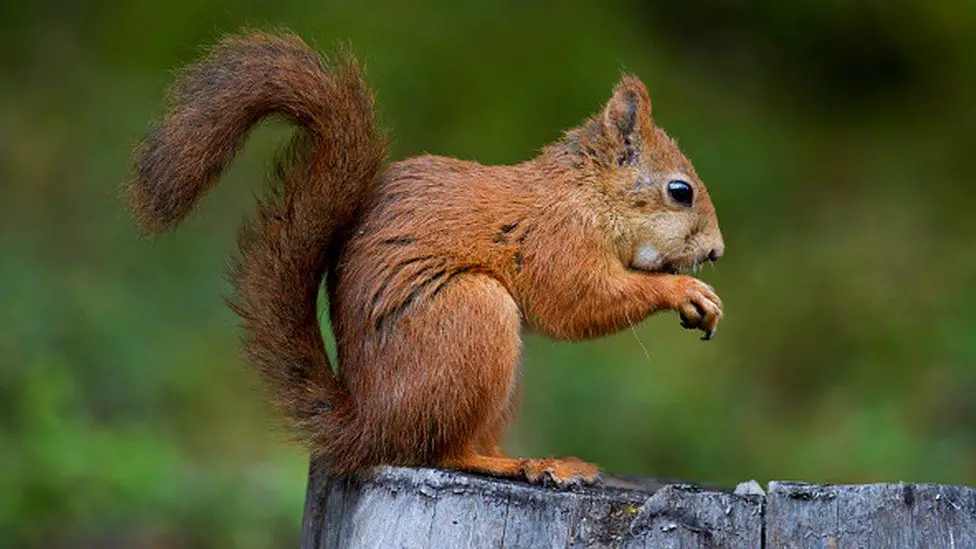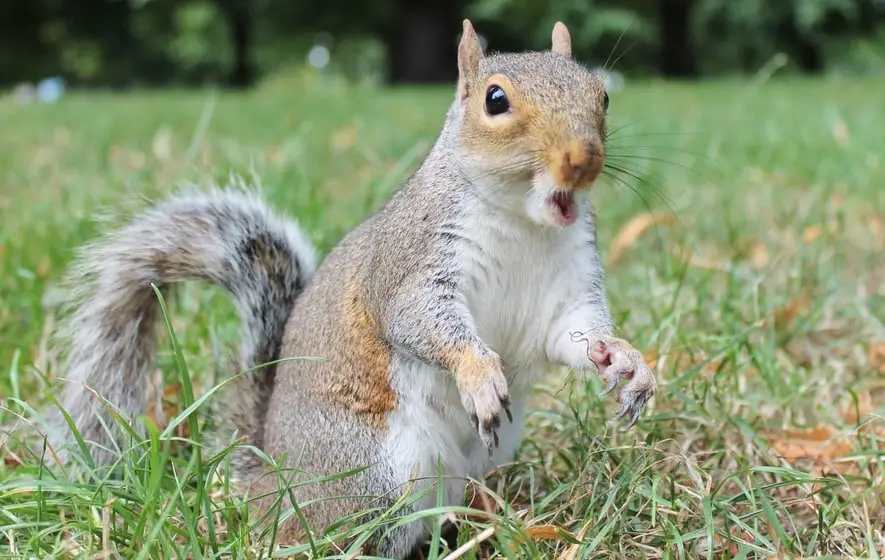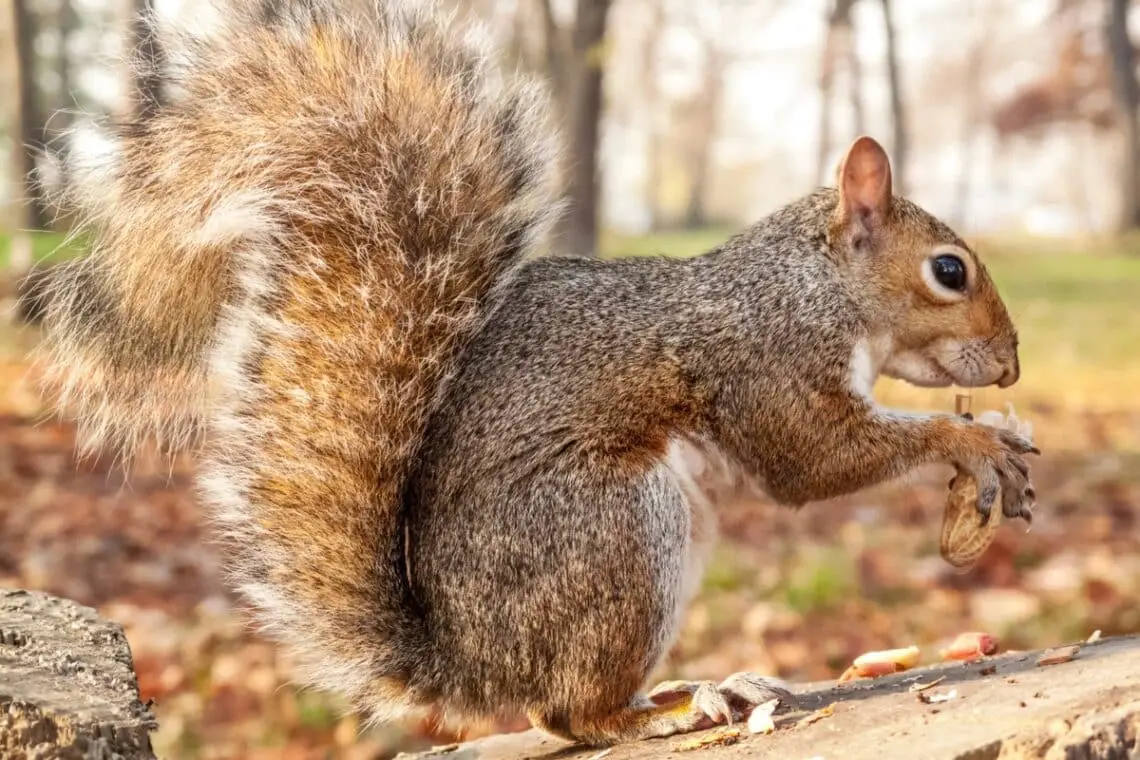Introduction
Are Squirrels Omnivores: Squirrels, those nimble and acrobatic creatures that dart through our parks, backyards, and forests, have long captivated the curiosity of both young and old. Their endearing antics and bushy tails make them a favorite subject for wildlife enthusiasts and casual observers alike. One question that often arises when pondering these fascinating rodents is whether squirrels are omnivores. To begin unraveling the dietary preferences of squirrels, we must first understand the basic biology and behavior of these rodents. Squirrels belong to the family Sciuridae, which encompasses a wide variety of species, including tree squirrels, ground squirrels, chipmunks, and marmots.
While the specific dietary habits may vary among these different types, the quintessential image of a squirrel feasting on a nut is a common sight for many. These nuts, including acorns, walnuts, and pecans, are indeed a staple in the diet of most squirrels, particularly during the fall when they gather and store these energy-rich morsels for the winter months. However, the idea of squirrels live as strict herbivores doesn’t capture the full scope of their dietary habits. Squirrels are opportunistic feeders, and their food choices can extend beyond nuts and plant matter. In fact, many species of squirrels have been observed consuming insects, bird eggs, and even small vertebrates on occasion.
This flexibility in their diet allows squirrels to adapt to varying food availability in different seasons and environments. To determine whether squirrels can be classified as omnivores, we must delve deeper into their dietary patterns, exploring the factors that influence their food choices and the role of animal-based foods in their nutrition. By examining their behavior, anatomy, and the ecological niches they occupy, we can gain a comprehensive understanding of the extent to which squirrels fit the omnivore label. So, let’s embark on a journey into the world of squirrels and their eating habits, uncovering the truth about whether these charming rodents are indeed omnivores.

Will a squirrel eat meat?
Yes, as we mentioned above, squirrels are omnivorous so it’s not unusual to spot them eating some type of meat. Most commonly, ground squirrels consume meat in their natural habitat. Their diet includes small snakes, lizards, mice, insects, etc.
Squirrels are primarily herbivorous creatures. Their diet mainly consists of plant matter, including nuts, seeds, fruits, and tree bark. This herbivorous nature is evident in their dental anatomy, as squirrels possess sharp incisors designed for gnawing through plant material.
Despite their herbivorous tendencies, squirrels are opportunistic feeders. This means they will occasionally diversify their diet based on food availability and their nutritional needs. In the wild, they may come across various food sources, including insects, bird eggs, and small vertebrates, which may pique their interest.
Squirrels have been observed consuming animal-based foods on occasion. They may forage for insects, such as caterpillars, grubs, and small beetles, especially when plant-based food is scarce. They may raid bird nests to steal eggs or even catch small prey like baby birds.
The consumption of animal-based foods by squirrels often exhibits seasonal patterns. During breeding and lactation, when the energy demands are higher, squirrels may be more inclined to include protein-rich animal matter in their diet to meet their nutritional requirements.
Is Squirrel a Veg or Nonveg?
Squirrels are omnivores, which means that their diet consists of both plants and meat. Squirrels primarily eat vegetarian foods. But they will also eat bird eggs, insects, mice, baby snakes. There is not much that squirrels will not eat, including their own young.
Squirrels are primarily herbivorous, which means that the majority of their diet consists of plant-based foods. Their menu includes a wide array of items such as acorns, walnuts, pecans, fruits, berries, and tree buds. Their sharp incisors are well-suited for gnawing through the tough shells of nuts and stripping the bark off trees. This herbivorous diet aligns with their dental anatomy and digestive system, which are optimized for processing plant material.
Despite their herbivorous tendencies, squirrels are opportunistic omnivores. This means that while they predominantly consume plant matter, they are not averse to incorporating animal-based foods into their diet when the opportunity arises. Squirrels may hunt for insects, such as caterpillars, grubs, and beetles, particularly when plant-based food sources are scarce. Insects a valuable source of protein and fats.
Squirrels are known to raid bird nests to steal eggs. Bird eggs are rich in nutrients, making them an attractive food source, especially during breeding seasons. While not a common occurrence, squirrels have been observed capturing and consuming small vertebrates like baby birds. This behavior is less frequent and typically associated with specific environmental conditions.
Is Squirrel a consumer or herbivore?
Herbivores like zebras, squirrels and rabbits make up a large group called primary consumers. Animals higher up the food chain eat the smaller animals before them. They are known as secondary consumers, and include animals like foxes and snakes. Animals that eat other animals are also called carnivores.
Herbivores are animals whose primary diet consists of plant material. They have specialized adaptations, both anatomical and physiological, that enable them to efficiently process and extract nutrients from plants. These adaptations typically include specialized teeth for chewing plant matter, an extended digestive system, and fermentation chambers where microorganisms help break down cellulose found in plant cell walls.
Squirrels, by and large, are classified as herbivores. Their diet primarily comprises plant-based foods, such as nuts (acorns, walnuts, pecans), seeds, tree buds, fruits, berries, and even tree bark. Their sharp incisors are well-suited for gnawing through the shells of nuts and stripping the bark off trees. Squirrels have evolved digestive systems that allow them to extract essential nutrients from plant materials.
In the ecological context, a consumer is an organism that obtains energy and nutrients by consuming other organisms. Consumers can further be categorized as herbivores, carnivores, or omnivores based on their primary food source. Squirrels, in this framework, fit the classification of herbivores because their primary energy source comes from consuming plant matter. However, it’s that they are not strict herbivores, as they exhibit some degree of dietary flexibility.
Why are squirrels omnivores?
So, back to that question about whether squirrels are omnivores. Yes they are. They have adaptations that allow them to eat everything from seeds and nuts to insects, eggs and other small rodents. Like all omnivores, they do best eating both animals and plants.
One of the primary reasons why squirrels exhibit omnivorous tendencies is adaptability. Squirrels inhabit diverse environments and encounter varying food availability throughout the year. To survive and thrive in these ever-changing conditions, they have evolved to be opportunistic feeders. Being omnivores allows them to exploit a wider range of food sources, increasing their chances of finding sustenance.
Squirrel diets can change dramatically with the seasons. In the fall, they meticulously gather and store nuts, seeds, and other plant-based foods for the winter when these resources become scarce. However, during the breeding season, lactation, or times of increased energy demand, squirrels may require protein and fat, which are often found in animal-based foods. This seasonal variation drives their occasional consumption of insects, eggs, and small vertebrates.
Squirrels, like all animals, have specific nutritional requirements. While they primarily obtain energy from carbohydrates in plants, they also need essential proteins and fats for various bodily functions. Animal-based foods offer a concentrated source of these vital nutrients. By incorporating occasional animal matter into their diet, squirrels can meet their nutritional needs more effectively, especially when plant-based sources are insufficient.
Is squirrel a red meat?
“It is almost exactly the same in taste as rabbit. It’s tasty, it’s not as gamey as rabbit, it’s a nice white meat. It’s good to cook down slowly and make stews from, and ragus for lasagne. It’s very good for you, it’s quite lean.
Squirrel meat, on the other hand, is often classified as “white meat” rather than red meat. White meat generally comes from animals with lower myoglobin content in their muscles, resulting in paler-colored meat. Squirrel meat, particularly that of tree squirrels like gray squirrels, is relatively light in color and has a milder flavor compared to red meats like beef or venison.
The classification of squirrel meat as white meat is largely based on its appearance and culinary characteristics rather than its biological classification. Squirrel meat is lean and low in fat, making it more similar in texture and taste to poultry, such as chicken or turkey.
In many culinary traditions, squirrel meat is prepared and cooked in a manner similar to other white meats. It is often used in stews, casseroles, and roasted dishes. Squirrel meat can be a valuable source of lean protein in regions where it is commonly hunted or considered a culinary delicacy.
Are humans omnivores?
Omnivore
Human beings are omnivores. People eat plants, such as vegetables and fruits. We eat animals, cooked as meat or used for products like milk or eggs.
Dental Adaptations: Humans have a combination of teeth that are typical of herbivores and carnivores. These include incisors for cutting, canines for tearing, and molars for grinding. This dental arrangement allows us to process a wide range of foods, both plant and animal.
Digestive System: Human digestive systems are versatile and adaptable. The human stomach produces digestive enzymes suitable for breaking down both plant and animal proteins. The length of our intestines, which is intermediate between that of herbivores and carnivores, enables the absorption of nutrients from a diverse diet.
Varied Diet: Throughout history, humans have consumed a wide array of foods, reflecting their omnivorous nature. Our diets include grains, vegetables, fruits, nuts, seeds, legumes, dairy products, and various types of meats and seafood.
Cultural and Geographic Variations: The diversity of diets around the world highlights our omnivorous adaptability. While some cultures predominantly emphasize plant-based foods, others rely heavily on animal-based sources. Geographical factors, including climate and food availability, also influence dietary preferences.
Is milk a Nonveg?
Milk comes from animals, most commonly cows, but it is not the animal’s flesh, so it is not meat. As a result, it can be classified as vegetarian. Vegans cannot consume milk, even if it is organic or directly from a farm.
Milk is considered a vegetarian food because it does not require the killing of an animal to obtain. It is a secretion produced by female mammals, including cows, goats, and sheep, to nourish their young. Humans have been domesticating and milking animals for thousands of years as a source of nutrition, without causing harm to the animals themselves.
The inclusion of milk in a vegetarian diet is widely accepted in various cultures and religious traditions. It is viewed as a compassionate and sustainable source of nutrients, as it does not involve the killing of animals. However, individuals may choose to abstain from milk or dairy products for other reasons, such as lactose intolerance, allergies, or ethical concerns related to dairy farming practices.
It’s while milk itself is considered vegetarian, it is not considered vegan. Vegans exclude all animal-derived products from their diets, including milk and dairy, due to ethical, environmental, or health reasons. Instead, they opt for plant-based milk alternatives like almond milk, soy milk, or oat milk.
Is pigeon non veg?
Pigeons are sometimes described as true omnivores (meaning they’ll eat both plants and meat; really almost anything they can find). But in practice, almost their entire diet consists of plant matter, including grains, grasses, green leafy vegetables, herbs, weeds, fruits, and berries.
Pigeon meat has been consumed as a food source for centuries in various cultures, particularly in regions where pigeon farming is prevalent. It is often featured in traditional dishes and is considered a source of protein. In the dietary context, foods are commonly categorized as vegetarian or non-vegetarian (nonveg) based on whether they involve the consumption of animal products.
Pigeon meat clearly falls into the non-vegetarian category because it is derived from animals. The classification of pigeon meat as non-vegetarian aligns with the ethical and cultural norms related to food consumption in many societies. It acknowledges the distinction between plant-based foods and those obtained from animals.
While pigeon meat is considered non-vegetarian by definition, individuals have diverse dietary preferences and may choose to include or exclude it from their diets based on factors such as taste, cultural practices, and personal beliefs. This classification aligns with the conventional distinctions between plant-based and animal-based foods in dietary and culinary contexts.

Conclusion
In squirrels are omnivores reveals a fascinating complexity in the dietary habits of these charismatic rodents. While squirrels are primarily known for their herbivorous tendencies, with a strong preference for nuts and plant matter, their classification as strict herbivores doesn’t quite capture the full picture. Instead, they exhibit opportunistic feeding behaviors that occasionally include animal-based foods, such as insects, bird eggs, and even small vertebrates. This flexibility in their diet is an adaptive strategy that allows them to survive and thrive in a variety of environments and situations.
The extent to which squirrels diet consume animal-based foods varies among species and can be influenced by factors such as food availability, seasonal changes, and local ecological conditions. For example, some species of squirrels may be more prone to including insects in their diet when plant-based foods are scarce or when they require protein for reproduction or energy during the breeding season. It’s essential to recognize that while squirrels may exhibit omnivorous behavior on occasion, they are not obligate omnivores like bears or raccoons, which rely heavily on animal-based foods for sustenance. Instead, squirrels remain primarily herbivorous, with their diet consisting predominantly of plant materials.
Moreover, the opportunistic inclusion of animal-based foods in their diet doesn’t necessarily place squirrels in the same category as true omnivores. True omnivores, like humans and some other mammals, have evolved specific anatomical and physiological adaptations that enable them to efficiently process and digest both plant and animal matter. Squirrels lack many of these specialized adaptations. In essence, while squirrels can exhibit a degree of dietary flexibility by occasionally consuming animal-based foods, their primary classification remains as herbivores. Their opportunistic behavior in seeking out these occasional protein-rich snacks serves as a testament to their adaptability in the wild.





No Comments